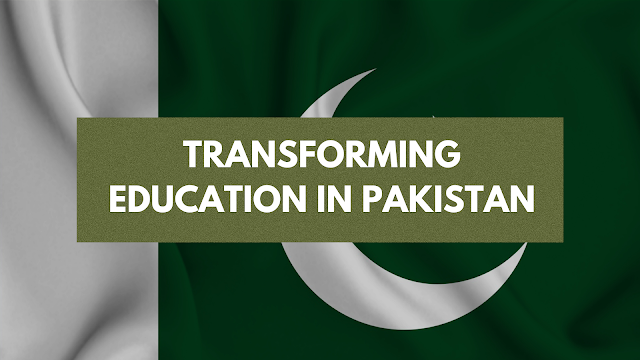Transforming Education in Pakistan: Challenges and Solutions
Introduction:
Education is the cornerstone of any nation's progress, development, and prosperity. It empowers individuals to understand their potential, make informed decisions, and contribute positively to society. However, in Pakistan, despite numerous policies and initiatives over the years, the education sector faces significant challenges that hinder its progress. This blog post delves into the issues plaguing Pakistan's education system and proposes potential solutions to build a brighter future.
Importance of Education:
Education is not just about acquiring knowledge; it's about fostering critical thinking, creativity, and responsible citizenship. A well-educated population contributes to economic growth, social cohesion, and overall human development. As Nelson Mandela said, "Education is the most powerful weapon which you can use to change the world."
Challenges in Pakistan's Education System:
- Inequality in Education:The education system in Pakistan is marked by stark inequalities. Different mediums of instruction, such as English medium schools, government schools, and madrassas, cater to various socio-economic classes, perpetuating a divide in society.
- Regional Disparities: Education quality varies greatly between provinces and regions. Schools in Baluchistan and FATA face inadequate infrastructure and low enrolment rates compared to Punjab and Sindh.
- Gender Disparity: Gender discrimination remains a significant hurdle, with a higher ratio of male students compared to females. This imbalance hampers the holistic development of society.
- Lack of Technical Education: A dearth of technical and vocational education programs leaves a significant portion of the population without employable skills, exacerbating unemployment and hindering economic growth.
- Untrained Teachers: Many teachers lack proper training, affecting the quality of education imparted to students. Teacher training programs are essential for nurturing a skilled teaching workforce.
- Funding Issues: Education receives a disproportionately low share of the national budget, hampering the development of adequate infrastructure, teacher training, and curriculum development.
- Poverty and Access: Financial constraints prevent many children from attending school, especially those from marginalized communities. Ensuring access to quality education for all is a significant challenge.
Solutions to Transform Education:
- Equity in Education: Implement policies to standardize education mediums, bridging the gap between different sections of society. Equal access to quality education should be a fundamental right.
- Technical and Vocational Training: Expand technical and vocational education programs to provide students with practical skills aligned with job market demands, reducing unemployment rates.
- Empowering Teachers: Invest in comprehensive teacher training programs to enhance pedagogical skills, subject expertise, and motivation among educators.
- Gender Inclusivity: Create an environment that encourages girls' education through awareness campaigns, scholarships, and gender-sensitive curriculum reforms.
- Increased Budget Allocation: Allocate a larger portion of the national budget to education to improve infrastructure, teacher training, curriculum development, and digital resources.
- Curriculum Overhaul: Revise the curriculum to promote critical thinking, problem-solving, and creativity. Foster a learning environment that prepares students for the challenges of the modern world.
- Public-Private Partnerships: Collaborate with private institutions to enhance the quality of education through shared resources, expertise, and innovative teaching methods.
Conclusion:
Transforming Pakistan's education system is imperative for the nation's progress. Addressing inequalities, ensuring gender parity, and improving teacher quality are crucial steps toward a brighter future. With the right policies, dedicated resources, and a collective effort from government, civil society, and individuals, Pakistan can build an education system that empowers its citizens and propels the country towards prosperity and development.

